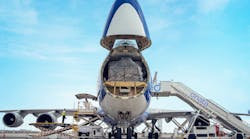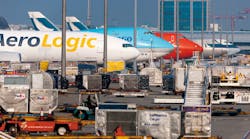Africa is a very dynamic region for the aviation industry, where it is experiencing growth thanks to an overall increase in political stability in many parts of the continent over the last several years.
This month we shall provide a regional update on aircraft ground handling in Africa and we will be looking at the advantages and disadvantages of the aircraft ground handling business in Africa, with particular focus on how airlines should find reliable partners.
A Fragmented Industry
The first thing that should be pointed out is that the aircraft ground handling infrastructure across the African continent is very fragmented, as over time, it has evolved following different patterns.
“It gets better in some parts of Africa but requires significant improvement in others. Some international ground handling organizations have come in to improve the situation even though other home based ground handling agents (GHA) in a few countries have developed with proper structures and resources for offering reliable aircraft ground handling services,” says Tom Ogendo, currently head of passenger services at Kenya Airways where he was head of ramp operations from 2012 to 2016.
Kenya Airways has a ground handling division – Kenya Airways Ground Handling Services – which has been ISAGO certified for the last six years and has operations in JKIA Airport in Nairobi and MIA in Mombasa. The company is the leading ground handling service provider in Kenya, where, besides handling Kenya Airways’ aircraft, it also handles some 20 other airlines that fly to Nairobi and Mombasa.
“The aircraft ground handling infrastructure across the African continent is aged and in need of a bust in funding. Most of the ground handling infrastructure was established in the 70s and 80s and has not really changed since then. The change, if any, that has taken place is for the worse, due to the high costs of newer equipment, which is needed in most countries,” says Lennia Bikoko, an aircraft ground handling quality and safety professional. “Contracting reliable partners is a really big challenge, the bigger companies are more interested in taking over rather than engaging in a partnership.”
The growth and development of ground handling services has been hampered by protectionist policies by a number of states, points out Ogendo.
“In most countries, the ground handling service companies are state-owned and, in such cases, most of these are monopolies. Due to lack of competition, there is little investment to improve the resources required for good service delivery in terms of staff training, equipment and other facilities required for aircraft ground handling. This has meant that most organizations offering ground handling services in Africa use old and sometimes obsolete equipment,” he says.
The airport authorities have found a way to monopolize the business around the provision of ground services and often are not at par with the global “best practices,” hence the level of expected services at such locations is actually lower in quality and safety parameters as compared with global figures, points out Maurizio Anichini of ground handling consultancy Twiga Aero.
In cases where the industry is liberalized, there are several small handling companies at a single airport and this results into price undercutting as all these providers compete for business.
“The result is a low return on investment and an inability to continually allocate resources for future investment on staff training and equipment renewal. The ground support equipment (GSE) required for aircraft handling is costly and all of it is imported from outside the African continent. It takes time to develop the maintenance capability to keep these pieces of equipment in good condition for safe aircraft handling,” says Ogendo.
“Most GSE manufacturers also offer inadequate technical support to the buyers of GSE and this impacts the reliability, safety and life span of the equipment. When airlines fly to countries where the GHA is a monopoly, there is normally no options to choose from and the handling rates in such countries are very prohibitive, hence affecting the bottom line of airlines. Airlines hence have not only to put up with poor service but also with high handling costs in such destinations which are by far the majority in Africa.”
Airline Challenges
In this context, the airlines are often experiencing issues and Twiga Aero’s Anichini provides an insightful anecdote.
“A new B787 is taxiing to its parking position on the inaugural flight at an airport in a country in southwestern Africa. In spite of the elaborate water cannon welcome from the fire brigade, the wingtip of the incoming aircraft strikes a flag pole. A flag pole you ask? What is a flag pole doing there to begin with?” he asks. “In many places, infrastructure is not commensurate with the changing times of today, let alone those of yesteryear, with very different – read smaller – aircraft types. Gone are the days of aluminium aircraft that mechanics will patch up quickly and for a few thousand dollars. The hole in the fuselage of the B747 would have cost about $200,000 USD. For the B787, it meant a $2,000,000 cost and several weeks on the ground.
“In terms of delays, airlines pay a high price for sub-standard systems such as baggage systems, which slow things down as companies seek to ‘go manual,’” he continues. “Airport redesign and infrastructure build-up appears to be old designs from more than 30 years ago being recycled, rather than leap-frogging to the future of smart airports.”
“Safety is key for airlines. In fact at Kenya Airways, we say ‘Safety is our License to Operate.’ When handling staff are not well trained, and handling equipment unreliable due to poor maintenance or obsolescence, safety suffers. Aircraft ground handling is a delicate activity as the safety of aircraft, equipment and personnel working around the aircraft is critical,” says Ogendo of Kenya Airways. “Aircraft also need to be safe at departure, void of any ground damage to ensure the safe operation of the flight, safety of the passengers and crew on board.
“Damage due to unserviceable GSE or inadequately trained staff is a major challenge faced by most airlines operating in Africa,” he adds. “Flight delays is yet another factor that affects airlines. This is caused more by ground service equipment failure, lack of or inadequate equipment. In other cases there is no compatible equipment to handle a particular aircraft category or perform a particular handling task on the ground. In destinations where the GHA is a monopoly, all carriers sign up with the single GHA, and where services clash in such destinations, carriers encounter delays due to inadequate capacity of the ground handler. Such delays can have reactionary effects on a carrier affecting the network integrity and aircraft utilization.”
Airlines are also limited in the expansion ambitions in destinations where the handler has limited capacity. A carrier may desire to increase capacity in terms of additional frequencies or bigger aircraft, but some handling agents have no capacity to handle such aircraft.
“Equipment for handling cargo freighters, for instance, remain a challenge in a number of destinations and thus airlines desiring to fly into such destinations cannot do so. Airlines have to make up with longer turnaround times in destinations where handling services are limited in capacity. This is to give longer ground time to match the handling capacity. This results in low aircraft utilization and higher costs,” says Ogendo.
Another issue in Africa is that of government interference.
“A lot of African airlines are either wholly or partly owned by their governments. Being government entities, they are liable to negative government interference in the form of poor decisions and the likes, resulting in the airlines being treated as personal entities,” says Bikoko. “Also plaguing the airlines is corruption coming as a result of being state entities; positions are filled by personnel based on who they know rather than qualifications and experience.”
Safety Initiatives
There are aircraft ground handling safety initiatives that the service providers are individually putting in place across Africa.
“Companies in Africa are usually front-runners. For example, Air Zimbabwe was the first company to be ISAGO registered. Who would have thought that?” points out Anichini of Twiga Aero, noting this is a demonstration of transformational leadership in the way of thinking about ground service provisions.
Airlines have taken it upon themselves to offer additional training for the GHA's handling staff in some areas.
“This is not the common practice in other parts of the world. ISAGO certification and Safety Management System (SMS) implementation, which are IATA initiatives, are slowly improving the safety landscape of ground handling services in Africa. In some airports, ground handlers under the umbrella of the airport or aviation authorities have come together to form airport safety action groups that are aimed at improving safety of aircraft handling on the ground,” Kenya Airways’ Ogendo says.
Anichini believes that more must be done to bring Africa-based companies at the forefront of global aircraft ground handling safety initiatives.
“IATA working groups usually meet in Europe and North America. African professionals do not have an easy time obtaining visas for the countries where meetings are held, hence their apparent ‘non-participation’ in standard-setting groups like IGOM,” he says. “Together with Richard Hunt, formerly at South African Airways, we managed to convince the IGOM group to meet in South Africa in February of 2017. Without including Africa in the mix, as a continent, African aviation leaders will not become the chairs and vice-chairs of standard setting groups, maintaining the reigning hand well placed in the hands of the non-African counterparts. This must stop and I encourage African aviation professionals to get involved and participate. I invite African aviation leaders to demonstrate their transformational leadership.”
The Role of International Players
International aircraft ground handling companies are investing in Africa and this is making the industry develop.
Systems, knowledge and management competence are their main contributions, according to Twiga Aero’s Anichini.
“International ground handling companies are developing in Africa and increasing their presence, though, at a slow pace. The companies bring with them better resources in terms of GSE and senior-evel expertise and better trained staff in ground handling matters,” notes Ogendo of Kenya Airways. “The main challenge with the international ground handling companies is that they seldom invest in new equipment for the stations they operate in Africa, but rather redeploy used equipment from other stations into Africa destinations. Their international network, though, accords them better technical support for their GSE in terms of spare parts requisition and technical advice.
“One other challenge with these international GHAs in Africa is their remuneration policy,” continues Ogendo. “All is not doom and gloom. We at Kenya Airways are determined to become a power house in ground handling and be the premier GHA in the region. We have worked hard to attain our current position and have mapped out areas of improvement as we seek to win in Africa.”










